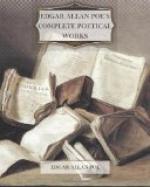* * * * *
OLD ENGLISH POETRY. [1]
It should not be doubted that at least one-third of the affection with which we regard the elder poets of Great Britain should be attributed to what is, in itself, a thing apart from poetry—we mean to the simple love of the antique—and that, again, a third of even the proper poetic sentiment inspired by their writings, should be ascribed to a fact which, while it has strict connection with poetry in the abstract, and with the old British poems themselves, should not be looked upon as a merit appertaining to the authors of the poems. Almost every devout admirer of the old bards, if demanded his opinion of their productions, would mention vaguely, yet with perfect sincerity, a sense of dreamy, wild, indefinite, and he would perhaps say, indefinable delight; on being required to point out the source of this so shadowy pleasure, he would be apt to speak of the quaint in phraseology and in general handling. This quaintness is, in fact, a very powerful adjunct to ideality, but in the case in question it arises independently of the author’s will, and is altogether apart from his intention. Words and their rhythm have varied. Verses which affect us to-day with a vivid delight, and which delight, in many instances, may be traced to the one source, quaintness, must have worn in the days of their construction a very commonplace air. This is, of course, no argument against the poems now—we mean it only as against the poets then. There is a growing desire to overrate them. The old English muse was frank, guileless, sincere and although very learned, still learned without art. No general error evinces a more thorough confusion of ideas than the error of supposing Donne and Cowley metaphysical in the sense wherein Wordsworth and Coleridge are so. With the two former ethics were the end—with the two latter the means. The poet of the “Creation” wished, by highly artificial verse, to inculcate what he supposed to be moral truth—the poet of the “Ancient Mariner” to infuse the Poetic Sentiment through channels suggested by analysis. The one finished by complete failure what he commenced in the grossest misconception; the other, by a path which could not possibly lead him astray, arrived at a triumph which is not the less glorious because hidden from the profane eyes of the multitude. But in this view even the “metaphysical verse” of Cowley is but evidence of the simplicity and single-heartedness of the man. And he was in this but a type of his school—for we may as well designate in this way the entire class of writers whose poems are bound up in the volume before us, and throughout all of whom there runs a very perceptible general character. They used little art in composition. Their writings sprang immediately from the soul—and partook intensely of that soul’s nature. Nor is it difficult to perceive the tendency of this abandon—to elevate immeasurably all the energies of mind—but, again, so to mingle the greatest possible fire, force, delicacy, and all good things, with the lowest possible bathos, baldness, and imbecility, as to render it not a matter of doubt that the average results of mind in such a school will be found inferior to those results in one (ceteris paribus) more artificial.




